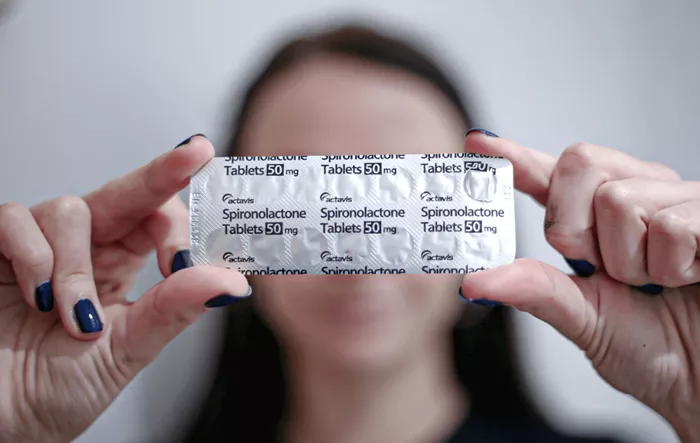Hot flashes are one of the most common and uncomfortable symptoms of menopause. Women often look for ways to manage these hot flashes, whether through lifestyle changes, herbal remedies, or medications. Spironolactone, a medication primarily used to treat high blood pressure and fluid retention, has recently gained attention for its potential benefits in treating hot flashes. This article explores whether spironolactone can help alleviate hot flashes and how it works in the body.
1. What Are Hot Flashes?
Hot flashes are sudden feelings of warmth, often accompanied by sweating, flushing, and sometimes chills. They are common during menopause due to hormonal changes, particularly the drop in estrogen levels. Hot flashes can vary in frequency and intensity, and they can interfere with sleep and daily activities.
2. How Hormonal Changes Cause Hot Flashes
During menopause, the ovaries gradually produce less estrogen. This decline in estrogen can disrupt the body’s ability to regulate temperature, leading to hot flashes. Estrogen plays a key role in maintaining the body’s internal temperature. When estrogen levels drop, the hypothalamus (the part of the brain responsible for temperature control) becomes more sensitive, triggering hot flashes.
3. What is Spironolactone?
Spironolactone is a medication that works as a potassium-sparing diuretic. It is commonly used to treat conditions like high blood pressure, heart failure, and fluid retention. Spironolactone blocks the action of aldosterone, a hormone that helps regulate fluid balance in the body. It is also sometimes used to treat conditions related to hormone imbalances, such as polycystic ovary syndrome (PCOS).
4. Can Spironolactone Help With Hot Flashes?
Spironolactone is not traditionally used to treat hot flashes, but some studies suggest that it may have a beneficial effect. Research has indicated that spironolactone may help balance certain hormones and improve symptoms of hormone-related conditions, like hot flashes. However, it is not a first-line treatment for hot flashes, and more research is needed to confirm its effectiveness.
5. How Does Spironolactone Affect Hormones?
Spironolactone has anti-androgen properties, meaning it blocks the effects of male hormones (androgens) in the body. This can be helpful for women with conditions like PCOS, where there is an imbalance of estrogen and androgens. By balancing hormone levels, spironolactone may reduce the severity of hot flashes, although this effect is not fully understood.
6. Benefits of Spironolactone for Women With Hot Flashes
For women experiencing hot flashes related to hormonal imbalances, spironolactone may offer some relief. It has been shown to improve symptoms of PCOS, such as acne and excessive hair growth, by reducing androgen levels. For some women, the hormonal balancing effect of spironolactone may help reduce the frequency or intensity of hot flashes.
7. Risks and Side Effects of Spironolactone
While spironolactone is generally well-tolerated, it does come with some potential side effects. These can include dizziness, headaches, changes in potassium levels, and menstrual irregularities. In rare cases, spironolactone may cause more serious side effects, such as hyperkalemia (high potassium levels), which can be dangerous. It is important to discuss the risks and benefits with a healthcare provider before using spironolactone to manage hot flashes.
8. Alternative Treatments for Hot Flashes
If spironolactone is not suitable for managing hot flashes, there are several other treatments available. Hormone replacement therapy (HRT) is one of the most effective treatments for hot flashes. Non-hormonal options, such as certain antidepressants, gabapentin, and lifestyle changes like exercise and stress management, can also help alleviate hot flashes.
9. How to Use Spironolactone Safely
If a healthcare provider prescribes spironolactone for hot flashes, it is important to follow their guidance. The medication should be taken as directed, and regular follow-up appointments are necessary to monitor for any potential side effects. Women using spironolactone should also avoid excessive potassium-rich foods or supplements, as spironolactone can raise potassium levels in the blood.
Conclusion
Spironolactone may offer some benefits for women experiencing hot flashes, particularly those with hormone imbalances like PCOS. However, it is not a standard treatment for hot flashes, and more research is needed to fully understand its effectiveness. Always consult with a healthcare provider before trying new treatments for hot flashes.
Frequently Asked Questions About Bipolar Disorder
1. What is bipolar disorder?
Bipolar disorder is a mental health condition characterized by extreme mood swings, including manic episodes (elevated mood) and depressive episodes (low mood). These mood changes can interfere with a person’s ability to function in daily life.
2. What are the symptoms of bipolar disorder?
Symptoms of bipolar disorder include extreme mood swings, impulsive behavior, difficulty concentrating, and changes in sleep patterns. Manic episodes may involve feelings of euphoria, excessive energy, and risky behavior, while depressive episodes involve feelings of sadness, hopelessness, and low energy.
3. How is bipolar disorder treated?
Bipolar disorder is typically treated with a combination of medication, such as mood stabilizers and antidepressants, and therapy. Cognitive-behavioral therapy (CBT) is commonly used to help manage the condition and improve the patient’s quality of life.
Related topics:
- The 8 Best Multivitamin For Women Over 65
- Does Soy Milk Help With Menopause Symptoms?
- 5 Best Menopause Supplement For Mood Swings


